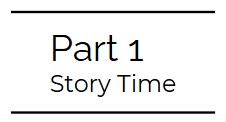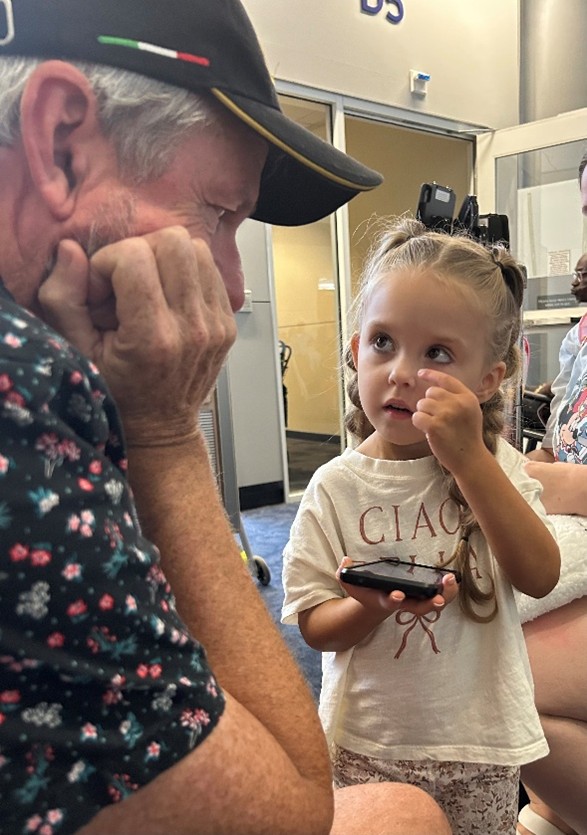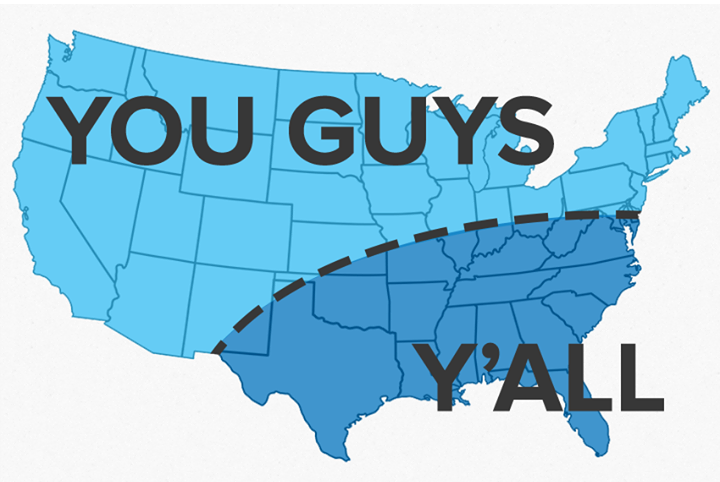
August started our next six weeks of travel (five different states for five different reasons, some via our Ford F150, some via plane, then a trip overseas to visit a friend), and we kicked it off by flying to Atlanta to celebrate the birth of our granddaughter, Naomi. Part of our job as grandparents was to keep older brother, Elias, occupied, which we did willingly. He’s a smart kid and fun to be around, and so far, he has accepted the new baby with enthusiasm.

I like to people-watch. Eavesdropping (or spying—what do you call it when you can’t hear but can watch?) often gives me ideas for things to write. Observing others is easy to do while traveling, and you get such a slice-of-life choice while in the airport. This trip was no different.
The first thing I noticed was a couple standing off to the side, out of the main flow of foot traffic rushing past. They faced each other, and he leaned in close, touching her face with a tender gesture. She stood stock still, gaze pointed over his shoulder. I wasn’t sure what they were doing, but the moment felt intimate, so I looked away.
As we passed them, I glanced over for a last peek. He held his hand in front of her face, and she leaned slightly forward, mouth pursed as if she were blowing the seeds off a dandelion. Realization struck.

He’d wiped an eyelash from her face, and she was now making a wish and blowing it off his fingertip.
So many thoughts flew through my mind. Triumph—I picked up enough clues to figure out what I witnessed. Curiosity—do people from other countries do the same ritual when an eyelash drops onto someone’s face? Tenderness—the couple had a history together. Their body language told a story.
Once we found our gate and settled in to wait for our trip to Georgia, we were confronted with the flurry of activity and personality that was Teagan, a three-year-old from Alabama who headed to Atlanta to participate in a beauty pageant. She’s been participating since she was six months old. Mom shared photos from her phone, and the hair and makeup extravaganza was just as bad (or good, depending on your point of view) as you might imagine.
Teagan first caught my eye because her mom had put her hair into an interesting braid, and I was trying to figure out how she’d done it. But after like ten seconds, Teagan inserted herself into our space and took over the show.

First, she looked me right in the eye and asked, in her lispy three-year-old voice, “Can I have a hug?”
Mentally, I sighed. Okay. This child is going to require my attention for the next thirty minutes, and I wasn’t really up for entertaining her. But how do you say no to a hug? So I said, “Sure!” and opened my arms wide. Then I fell in love. She chattered on about everything. I asked her if three-year-olds had to do a talent at their pageant. They do. Hers is usually dance (she takes ballet lessons). And sometimes she sings if she feels like it. Spontaneously, I wondered? So my husband, John, pulled up pictures of ballet dancers on his phone. “Can you do that?” he asked, showing her a dancer posed en pointe, arms held gracefully in the air. She placed a hand on his knee and leaned in close to peer at the photo.

“Mama! That’s you.”
Mom looked up from her phone and chuckled. “No, baby. That’s not me.” She looked at us with a self-deprecating shrug. “I used to dance. She’s seen pictures of me at home.”
Mom probably weighed a good eighty pounds more than the ballerina in the photo. But Teagan didn’t notice that. She saw a lovely, graceful dancer and thought she looked just like her mother.
That got me thinking, and I pondered it while John and Teagan moved on to pulling up photos of the moon (she likes space). What do I need to change about the way I see things to have the same attitude as Teagan? How can I notice only the very best in others? How can I see my neighbors the way God sees me, recognizing and encouraging the potential, the good, and forgiving all the rest? That attitude certainly won’t come easy, but I want to try.
“Therefore, if anyone is in Christ, the new creation has come: The old has gone, the new is here! All this is from God, who reconciled us to himself through Christ and gave us the ministry of reconciliation: that God was reconciling the world to himself in Christ, not counting people’s sins against them” 2 Corinthians 5: 17-19.
Later, after disembarking the plane and riding the tram across the airport, we heard Teagan’s mom call up to us. We had just stepped onto the escalator to ride up to the parking level, and they were passing by on their way to the elevator.
“Hey!” she called. We glanced over the edge as we rose. There stood Teagan, waving her hand madly, grinning from ear to ear. “She wanted to say goodbye.”
I smiled and waved back just as enthusiastically. “Bye, little friend! Good luck at your pageant.”
My friend Tracy Redman always encourages us when we travel—talk to a stranger and make a new friend. I’m glad I let Teagan into my life, even if only for a while.

I’ve decided to self-publish book number four instead of going the traditional route. Made for More is currently in the final stages of editing and will go through a round of beta readers. If you’re interested in getting an advance reader’s copy (ARC) of a Christian romance starring a rock star and a high school teacher (how does that even work? Read it to find out), and providing feedback, let me know. I’ve hired a book-cover designer. Now I wait. My plan is to have the book out by October this year.
My friend Cathy Rueter just had her debut novel come out. She writes Christian suspense, and this book, Murder May I?, was published by Elk Lake Publishing Inc. I have an author interview with her posted on my website. Check it out here … https://paulapeckham.com/lets-talk-about-books/ . Her book revolves around the fashion world. I love getting peeks into environments I know nothing about and learning something new. Her story gives just the right amount of hints to keep you guessing, but without giving everything away in Chapter Three. I really enjoyed Cathy’s story. I hope you will too. You can buy a copy on Amazon. https://a.co/d/cprapIj

I’m traveling to Washington State in September to teach a class on ProWritingAid at the Southwest Washington Writers Conference (one of the five different states in our fall travel). I purchased a lifetime access to the program but knew I wasn’t getting my money’s worth. There is SO much it can do. So I did some research and went through every tool PWA offers, making notes along the way. If the conference records the sessions, I’ll provide a link to the presentation on my website, in case you’re considering purchasing PWA for yourself. In my opinion, buying the program was money well spent, and I wholeheartedly recommend it to anyone who writes.


While in Georgia, my daughter-in-law, Jonnique, recommended watching an eight-part Netflix series titled “The Trunk.” It’s Korean and uses subtitles. (Side note: this is our third Korean show, and they are VERY good at crying. Tears flood eyes, they drip dramatically over an eyelid and roll down a cheek – very realistic.) It really confused me for the first episode or two, but it totally sucked me in. I loved the male main character. We binged the show in four days. I didn’t LOVE the ending because it left me with several questions, but thankfully, there is a book by the same name, so I downloaded it to my phone, and I’ll read it on my way home to Texas tomorrow on the plane. The show gave me a good lesson on how to drip, drip, drip the clues into the story while building up to the grand reveal at the end.




































